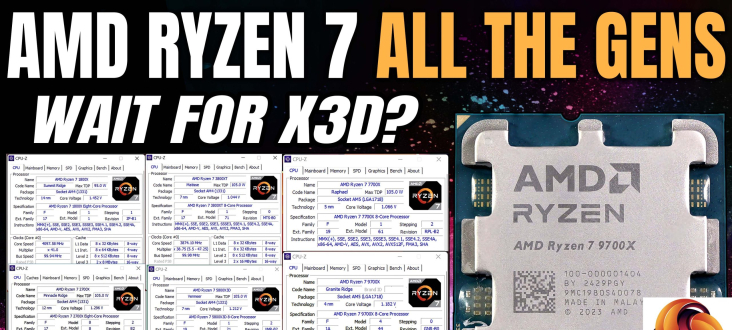In front of me are six different AMD Ryzen 7 processors, each featuring a unique iteration of Zen technology. The original Zen, known as Summit Ridge, launched in 2017 and was manufactured on GlobalFoundries' 14nm process. The following year saw the introduction of Zen Plus, or Pinnacle Ridge Ryzen 2000, which was fabricated on GlobalFoundries' 12nm process. A significant advancement occurred in 2019 with Zen 2, codenamed Matisse, exemplified by the Ryzen 3000 series, which was manufactured using TSMC's 7nm technology. In 2020, a refinement was introduced with Zen 3, or Vermeer, represented by the Ryzen 5000 series, also fabricated using TSMC's 7nm. The evolution continued with Zen 4, or Raphael, in 2022, resulting in the Ryzen 7000 series fabricated on TSMC's 5nm process. Lastly, as we approach 2024, Zen 5, also referred to as Granite Ridge or Ryzen 9000, is manufactured on TSMC's 4nm process.
Now, while you might be well-versed in these technologies, I want to shift gears. Contrary to appearances, AMD EPYC processors aren't made from Lego blocks—though I've utilized Lego as a fun illustrative tool to showcase an EPYC processor.
Last week, KitGuru released a video covering the implications of an AMD blog post regarding Windows 11 24H2, suggesting performance improvements over the current Windows 23H2. Following various tests, we discovered that updating Windows does indeed confer some benefits and that the VBS setting in Windows 11 significantly affects performance. The rapid evolution of Windows updates proved to be a moving target. Just yesterday, as I was finalizing my testing, Microsoft released a patch for Windows 11 that seems to deliver many benefits previously associated with the 24H2 release onto Windows 23H2, particularly regarding branch prediction utilized by AMD processors. This situation is both exciting and somewhat confusing, suggesting that AMD may have launched Zen 5 before Windows 11 was fully prepared for it.
Considering generational improvements, I wondered how significant the advancements are across the families of Ryzen processors—from Zen to Zen Plus, Zen 2, Zen 3, Zen 4, and now Zen 5. I set out to analyze each generation closely. For benchmarking, I used the same MSI MEG X670E Ace motherboard and G.Skill Trident Z Neo D 5600 memory rated for both Expo and XMP on Socket AM4. However, testing for earlier generation Ryzen processors proved to be more complex due to compatibility with specific motherboards. I employed a Gigabyte X470 AORUS Gaming 7 Wi-Fi to accommodate the original Ryzen processors, using G.Skill Flare X memory rated at 3200 DDR4.
All test setups shared common components, including a Gigabyte GeForce RTX 4080 Gaming OC graphics card and a Corsair PX600 ATX 3 power supply. I conducted my testing on Windows 11 23H2 with VBS disabled for consistency, but noteworthy is that I did not incorporate the latest branch prediction patch in this round of tests.
In evaluating Cinebench 2024 and Geekbench 6 multicore results, I plotted the performance across generations. Zen 5 shows a notable, albeit small, lead over Zen 4 while demonstrating a larger margin over Zen 3 due to newer instructions. The Ryzen 79700X proved to be slightly more efficient in power than the Ryzen 77700X, showcasing a win for Zen 5, albeit with a narrow margin compared to Zen 4's Ryzen 7800X 3D in terms of performance per watt.
Regarding temperatures using the Fantech Glacier 1360 D30 AIO cooler normalized for 25°C, the Ryzen 7 1800X operated at a cool 53°C, while the new Zen 5 9700X registered at 57°C. The AMD Ryzen 7 7700X, on the other hand, drew significantly more power at 140W, reaching temperatures of 87°C.
When analyzing single-core performance in Cinebench R23, Zen 5 maintains a healthy advantage over Zen 4. In Blender's rendering tests and gaming benchmarks, such as Far Cry 6, Avatar: Frontiers of Pandora, and others at 1080p, Zen 5's performance fluctuated but generally showed strong results, particularly in comparison to earlier Zen generations.
In closing, the notable takeaways are that gamers might consider waiting for the upcoming Ryzen 7 3D at CES 2025, as it holds potential for significant enhancements, and the new Windows patch might greatly benefit gaming performance. Additionally, the upcoming motherboards supporting faster DDR5 memory for both Zen 4 and Zen 5 processors could prove intriguing for those planning new builds. Ultimately, if you're contemplating an upgrade, it may be worth waiting for the X670 motherboards before deciding whether to leap from Zen 2 or 3 to Zen 4 or Zen 5.

 www.kitguru.net
www.kitguru.net



















